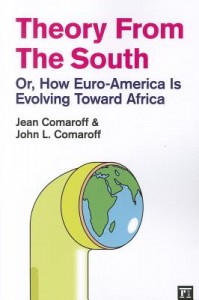 Jean and John Comaroff will be visiting UMass this week, and in anticipation of their visit, I spent the morning reading the forum on their book, Theory from the South: How Euro-America is Evolving toward Africa in Cultural Anthropology. As someone who directs a program dedicated to the anthropology of Europe, I especially appreciated the way the Comaroffs turn our attention to Africa in a way that anthropologizes the “global North”–that is, that asks people to question taken-for-granted assumptions about the evenness and ubiquity of “modernity” in Europe and north America.
Jean and John Comaroff will be visiting UMass this week, and in anticipation of their visit, I spent the morning reading the forum on their book, Theory from the South: How Euro-America is Evolving toward Africa in Cultural Anthropology. As someone who directs a program dedicated to the anthropology of Europe, I especially appreciated the way the Comaroffs turn our attention to Africa in a way that anthropologizes the “global North”–that is, that asks people to question taken-for-granted assumptions about the evenness and ubiquity of “modernity” in Europe and north America.
Here are some of the ideas from the forum (which included not only Jean and John Comaroff, but also Achille Mbembe and James Ferguson, among others) that particularly spoke to me:
The Comaroffs point to the usefulness of the “global South” as an analytic vantage point for thinking about global processes–rather than assuming that the important action is from the core to the periphery:
“Analytically, … it always points to an ‘ex-centric’ location, an elsewhere to mainstream Euro-America, an outside to its hegemonic centers, real or imagined. For our purposes here, then, its importance lies in that ex-centricity: in the angle of vision it provides us from which to estrange our world in its totality in order better to make sense of its present and future. (Comaroff and Comaroff 2012)
I like the fact that they flag, “real or imagined” with reference to hegemonic centers. I have seen first-hand the unevenness of “Europe” that exists side-by-side with the idealized, aspirational image of “joining Europe.” I worked first in Hungary–the old “second world” before it joined the periphery of the “global North” through neoliberal transformation of the socialist welfare state and the EU accession process. More recently, I’ve turned to Portugal–long ago a colonial center, more recently a European semiperiphery eclipsed by its former colony, Brazil. Boaventura de Sousa Santos writes of Portugal’s love affair with “the imagination of the core,” an imagined European future that was tantalizing enough in the early 1980s to draw the political class away from the reforms of the 1974 Revolution. How times have changed: last year, Portuguese PM suggested that Portugal’s problems could be solved by unemployed workers migrating to Brazil and Angola. This comment spurred indignation in Portugal, but in some respects, it is already happening.
In Mbembe‘s response to the Comaroff’s book, he outlines the ways that the global financial crisis has highlighted the writes:
“The pre-emption—or even suspension—of democracy by market forces is now propounded as the only rational and responsible behavior in a world in which individual debt, public deficits and public debt have resulted in the mortgaging of the future of entire nations and the quasi-expropriation of their citizens. Euro-American democratic states—just like African states during the long years of structural adjustment programs—are in danger of being ‘turned into debt-collecting agencies on behalf of a global oligarchy of investors’ and the propertied classes now firmly entrenched in what looks like ‘apolitically unassailable stronghold, the international financial industry’ (Streeck, 29).”
But rather than end on this cheery note, I will instead point to signs of friction: the weekly news report of ongoing popular resistance to the “debt-collector” model of the state that we are witnessing on the northern shores of the Mediterannean: in Spain, Greece, and Portugal (OK, technically the Atlantic shore), just across the sea from the Arab Spring uprisings of last year, and further afield, miners’ battles in the Comaroff’s home country of South Africa…
